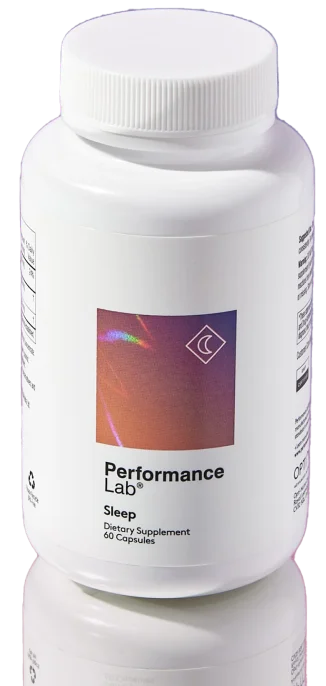Many people are familiar with the role of vitamin C in immune health. Knocking back a glass of vitamin C-rich OJ can help boost your immune system and fend off that nasty cold.
Or maybe you know it for its ability to enhance wound repair. Whatever the job is, vitamin C is essential for normal physiological function.
But did you know that vitamin C may also support better sleep?
It's estimated that between 30-35% of adults globally suffer from some symptoms of insomnia. The prevalence of sleep problems as a whole may be much higher in the United States, estimated at 56%. (1)
Most people aren’t familiar with vitamin C's role in sleep, but studies suggest that people with higher levels of vitamin C have better sleep and are more resilient to occasional sleep loss.
This article dives into everything you need to know about vitamin C and sleep—plus how you can fulfil your vitamin C requirements and get the best sleep of your life.
What Is Vitamin C?

Vitamin C, also called ascorbic acid, is a water-soluble vitamin that’s always been known for its role in immune health - but it does much more than just strengthening your immune system.
Because it’s water-soluble, vitamin C must be replaced daily to ensure high levels, as excess is not stored and excreted in the urine.
While some mammals can produce vitamin C, humans lack the enzyme - gluconolactone oxidase -needed to make ascorbic acid. As such, it must come through diet or supplementation.
Besides its role in supporting immune function, what else does dietary vitamin C do? It’s involved in:
-
Collagen synthesis and wound repair
-
Bone formation
-
Blood vessel integrity
-
Antioxidant defenses and regeneration
-
Immune function
-
Nitric oxide bioactivity
-
Neurotransmitter synthesis
-
Maintaining iron stores
-
Cognitive function
-
Mood. (2)
One of its other prominent roles is as a potent antioxidant. Vitamin C can act as a powerful free-radical scavenger and help regenerate vitamin E because it functions as an electron donor (and, therefore, a reducing agent).
Most of its physiological and biochemical actions are attributed to its antioxidant properties. (3). When other molecules react with a free radical, they lose an electron on their outer shell, which causes them to become unstable and highly reactive.
Vitamin C, however, remains relatively stable with one less outer electron, which means it can effectively scavenge radicals without itself becoming one.
How Much Vitamin C Do We Need?
The recommended daily amounts of vitamin C are:
-
90mg for adult men.
-
75mg for adult women. (4)
Where to Find Vitamin C
As the body doesn't make vitamin C, you need to either find it from your food or from supplementation.
Sources of vitamin C-rich foods include: peppers, broccoli, spinach, potatoes, tomatoes, citrus fruits and berries.
You can also find it in standalone dietary supplements, such as Performance Lab Vitamin C.
While adequate vitamin C intake is essential for cardiovascular health, cognitive function, bone health, immunity, and more, its benefits may also extend to sleep. Before we examine that in depth, let's just remind ourselves of how much sleep is enough...
How Much Sleep Do We Need?

How much sleep do we need, and when is it considered insufficient sleep?
The National Sleep Foundation recommends that:
-
Healthy adults aged 26-64 should get between 7-9 hours a night.
-
Older adults over 65 need 7-8 hours a night.
-
Insufficient sleep is classed as less than 6 hours a night for adults (64 and younger) or less than 5-6 hours for older adults. It is associated with psychological, physical and physiological impairments. (5)
So how might dietary vitamin C intake contribute to sleep health? Let’s find out…
The Vitamin C Sleep Connection
1. Sleep Quality And Duration
If you’ve had dreams about getting the most epic sleep of your life but haven’t been able to make it a reality, it might be worth looking at your nutrient intake, especially vitamin C.
Research on vitamin C intake and sleep shows that adequate vitamin C intake may be linked to better sleep health.
While low intakes of vitamin C are typically linked to weakened immune defenses, low levels could also interfere with sleep quality, potentially contributing to insomnia symptoms and short sleep duration.
According to a study published in Appetite, people who only slept six hours per night had lower levels of vitamin C than people who slept longer (6).
Another study based on the NHANES database (National Health and Nutrition Examination Survey) found that adults with short sleep had poor vitamin C intake. It also discovered that a greater number of older adults (aged 51-99) with short sleep had an inadequate intake of nutrients.
This highlights the role of overall diet intake as a factor influencing sleep duration and quality, suggesting the potential need for supplementation with age.
Vitamin C may have a protective factor for sleep
Likewise, women participants who reported poor sleep tended to have inadequate levels of several nutrients, such as calcium, magnesium, and vitamins A, D, E, and K, as well as vitamin C. This occurred across all age groups. (7)
Another 2024 study also discovered that serum vitamin C may act as a protective factor for sleep troubles among women in particular.
The researchers concluded that moderately increasing vitamin C-rich foods to sufficient dietary vitamin levels may help improve women's sleep quality. Plus, supplementation should be considered an option. (8)
A daily multivitamin - such as Performance Lab NutriGenesis Multi - may be particularly useful for women and older adults who tend to lack vitamin C and other nutrients as well.
Maintaining nutritional adequacy is important for restorative sleep and may offer a reduced risk of insomnia.
Getting back to vitamin C… supplementing vitamin C likely isn’t going to help you sleep longer, but there is a proposed link between sleep duration and vitamin C levels, suggesting that lower levels increases nightly sleep disturbances and heightens the risk for sleep disorders. Conversely, could higher dietary vitamin c prevent sleep disorders?
A small study found that people who ate two kiwis each day - kiwis contain 142% of the DV of vitamin C- an hour before bed slept 13% longer than those who didn’t eat the kiwi and fell asleep faster. (9)
But there’s another way to get a good night’s rest - Performance Lab Sleep. While it may not contain vitamin C - you can get that with Performance Lab NutriGenesis Multi - it does have natural melatonin from Montmorency cherries plus three forms of magnesium to relieve tension and help you drift off to la-la land quickly.
2. May Relieve Movement Disorders

Although it’s not the most common disorder, restless leg syndrome (RLS) can wreak havoc on your sleep. People with restless leg syndrome have an uncontrollable urge to move their legs at rest, especially at night - as you can imagine, this often leads to insufficient sleep.
Some people experience pain or the sensation of carbonation in the veins, and relief only comes with standing or moving their legs. Period limb movements (PLM) are also common in people with RLS at night, drastically reducing sleep efficiency (10).
But there’s good news—previous research shows that vitamin C potentially improves sleep quality, itching, and restless legs syndrome. (11) Although the exact mechanism isn’t known, iron deficiency can be a cause of RLS, and vitamin C improves the absorption and storage of non-heme iron.
Effective disease control through nutritional interventions like vitamin C supplementation may help manage movement disorders such as RLS and improve sleep outcomes.
3. Improves Obstructive Sleep Apnea (OSA)
Obstructive sleep apnea (OSA) is a condition whereby the airways become blocked during sleep, making breathing challenging. It’s one of the most common sleep related breathing disorders. People with OSA often stop breathing for seconds at a time and wake up with a large, deep gasp for air, leading to significant sleep disturbance.
The abrupt awakenings that come with OSA make it challenging to get enough quality sleep, so people often wake feeling unrested. However, vitamin C supplementation has been shown to improve symptoms of obstructive sleep apnea.
A 2009 study found that combining 100mg vitamin C with 400 IU vitamin E twice daily reduced episodes of apnea—the breathing interruptions characteristic of the condition. The vitamin combination also improved sleep quality and decreased daytime sleepiness. (12)
One of the other things that comes with sleep apnea is an increased risk of cardiovascular disease and coronary heart disease. (13) Left untreated, obstructive sleep apnea can lead to high blood pressure and metabolic syndrome (obesity, arrhythmia, cardiovascular complications).
OSA happens when the endothelial lining (lining of the blood vessels) malfunctions, interfering with blood circulation and impairing vascular function. (14) But the superstar nutrient swoops in to improve endothelial function, potentially mitigating some of the stress on the vascular systems linked to OSA, offering somewhat of a protective effect.
Vitamin C therefore may enhance vascular function and support cardiovascular health in OSA patients, helping to maintain proper blood vessel performance.
Additionally, hypertension status may influence the protective effect of vitamin C on sleep disorders, with individuals with hypertension showing a more significant benefit. (15).
4. Insomnia caused by Anxiety, Depression, Stress
Research suggests that vitamin C intake may influence psychiatric disorders, including depression and anxiety, which are often associated with sleep disturbances.
Vitamin C is a known cofactor for dopamine to convert to norepinephrine (NE), known to affect your sleep-wake cycle, memory and mood.
Chronic lack of vitamin C may lead to decreased norepinephrine levels, which can cause anxiety and depression, among other things. Both are known causes of insomnia.
Several studies have shown that supplementing with ascorbic acid (the chemical name for vitamin C) improved mood and produced an antidepressant effect. Keeping vitamin C levels topped up, therefore, may help mood and have a knock-on effect with sleep.
Additionally, studies have linked vitamin C supplementation to reduced memory impairment in individuals experiencing sleep problems, highlighting its potential role in preventing neurocognitive issues related to sleep disorders. (16-20)
Best Natural Sleep Aid

Topping up your vitamin C levels is a good idea to help better sleep - here's another one: Performance Lab Sleep. As I mentioned earlier, it's a quality sleep supplement that combines proven ingredients beneficial for sleep.
It may not include vitamin C, but it has Montmorency tart cherries - to supply a low-dose of natural melatonin, the all-important sleep hormone. Tryptophan helps to boost natural serotonin and melatonin levels further, while magnesium helps to relax muscles.
Lemon balm completes the formula and is included for its potential calming qualities.


Other Benefits Of Vitamin C
While vitamin C may benefit those struggling with sleep deprivation, it has plenty of other essential roles in maintaining optimal function:
Strengthens The Immune System

Vitamin C’s immune-boosting powers are one of its most notable functions. It’s required for effective immune responses by supporting the adaptive and innate arms of the immune defense system and scavenging free radicals that can damage cells and lead to oxidative stress and inflammation. (21)
High levels of oxidative stress are heavily involved in the development of chronic and degenerative diseases.
If you want to ensure you’re getting enough vitamin C to support immune function, consider popping back Immune daily. It’s a dynamic immune supplement designed to supercharge every aspect of your immune system for robust immune responses and broad-range immune support.
Neurotransmitter Synthesis And Mood
Vitamin C is required for regulating neurotransmitter biosynthesis, especially of the catecholamines dopamine, norepinephrine, and epinephrine.
As I said above, it acts as a cofactor for dopamine β-hydroxylase, which converts dopamine to norepinephrine. Because of this, it’s essential for regulating brain function and mood. (22)
Maintains Healthy Connective Tissues
Vitamin C is an essential cofactor for two enzymes involved in collagen synthesis: prolyl hydroxylase (stabilizes the collagen molecule) and lysyl hydroxylase (provides structural strength via cross-linking). (23)
Collagen forms the basis of all connective tissues (tendons, ligaments, bone, skin, blood vessels, etc.). Low levels have been linked to dermatological symptoms, bone and joint problems, bleeding gums, and more.














